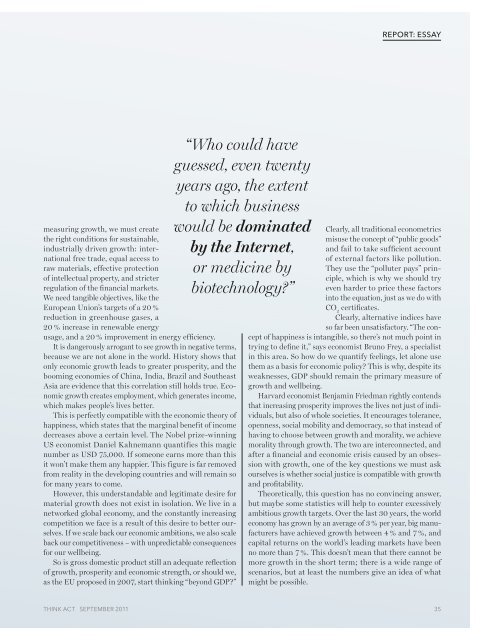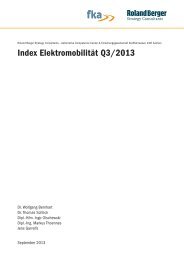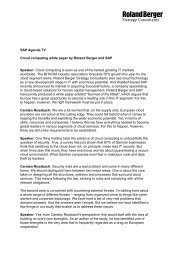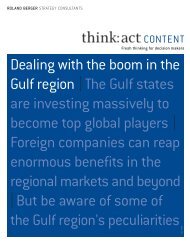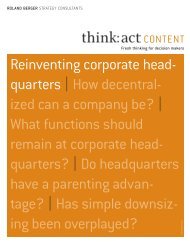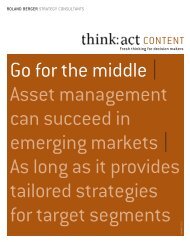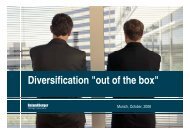think: act magazine No. 17 - Size Matters - Roland Berger
think: act magazine No. 17 - Size Matters - Roland Berger
think: act magazine No. 17 - Size Matters - Roland Berger
You also want an ePaper? Increase the reach of your titles
YUMPU automatically turns print PDFs into web optimized ePapers that Google loves.
RepORt: eSSaymeasuring growth, we must createthe right conditions for sustainable,industrially driven growth: internationalfree trade, equal access toraw materials, effective protectionof intellectual property, and stricterregulation of the financial markets.We need tangible objectives, like theEuropean Union’s targets of a 20 %reduction in greenhouse gases, a20 % increase in renewable energyusage, and a 20 % improvement in energy efficiency.It is dangerously arrogant to see growth in negative terms,because we are not alone in the world. History shows thatonly economic growth leads to greater prosperity, and thebooming economies of China, India, Brazil and SoutheastAsia are evidence that this correlation still holds true. Economicgrowth creates employment, which generates income,which makes people’s lives better.This is perfectly compatible with the economic theory ofhappiness, which states that the marginal benefit of incomedecreases above a certain level. The <strong>No</strong>bel prize-winningUS economist Daniel Kahnemann quantifies this magicnumber as USD 75‚000. If someone earns more than thisit won’t make them any happier. This figure is far removedfrom reality in the developing countries and will remain sofor many years to come.However, this understandable and legitimate desire formaterial growth does not exist in isolation. We live in anetworked global economy, and the constantly increasingcompetition we face is a result of this desire to better ourselves.If we scale back our economic ambitions, we also scaleback our competitiveness – with unpredictable consequencesfor our wellbeing.So is gross domestic product still an adequate reflectionof growth, prosperity and economic strength, or should we,as the EU proposed in 2007, start <strong>think</strong>ing “beyond GDP?”“Who could haveguessed, even twentyyears ago, the extentto which businesswould be dominatedby the internet,or medicine bybiotechnology?”Clearly, all traditional econometricsmisuse the concept of “public goods”and fail to take sufficient accountof external f<strong>act</strong>ors like pollution.They use the “polluter pays” principle,which is why we should tryeven harder to price these f<strong>act</strong>orsinto the equation, just as we do withCO 2certificates.Clearly, alternative indices haveso far been unsatisf<strong>act</strong>ory. “The conceptof happiness is intangible, so there’s not much point intrying to define it,” says economist Bruno Frey, a specialistin this area. So how do we quantify feelings, let alone usethem as a basis for economic policy? This is why, despite itsweaknesses, GDP should remain the primary measure ofgrowth and wellbeing.Harvard economist Benjamin Friedman rightly contendsthat increasing prosperity improves the lives not just of individuals,but also of whole societies. It encourages tolerance,openness, social mobility and democracy, so that instead ofhaving to choose between growth and morality, we achievemorality through growth. The two are interconnected, andafter a financial and economic crisis caused by an obsessionwith growth, one of the key questions we must askourselves is whether social justice is compatible with growthand profitability.Theoretically, this question has no convincing answer,but maybe some statistics will help to counter excessivelyambitious growth targets. Over the last 30 years, the worldeconomy has grown by an average of 3 % per year, big manuf<strong>act</strong>urershave achieved growth between 4 % and 7 %, andcapital returns on the world’s leading markets have beenno more than 7 %. This doesn’t mean that there cannot bemore growth in the short term; there is a wide range ofscenarios, but at least the numbers give an idea of whatmight be possible.THINK AcT sepTember 2011 35


